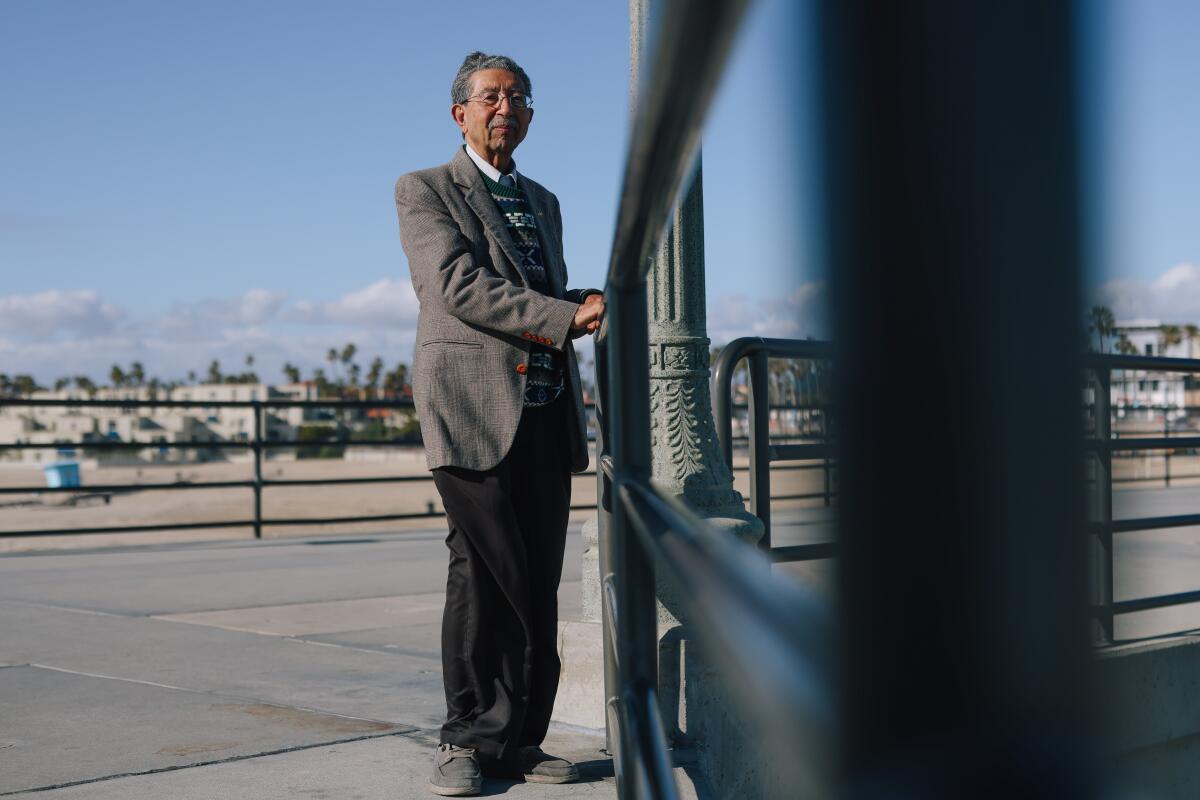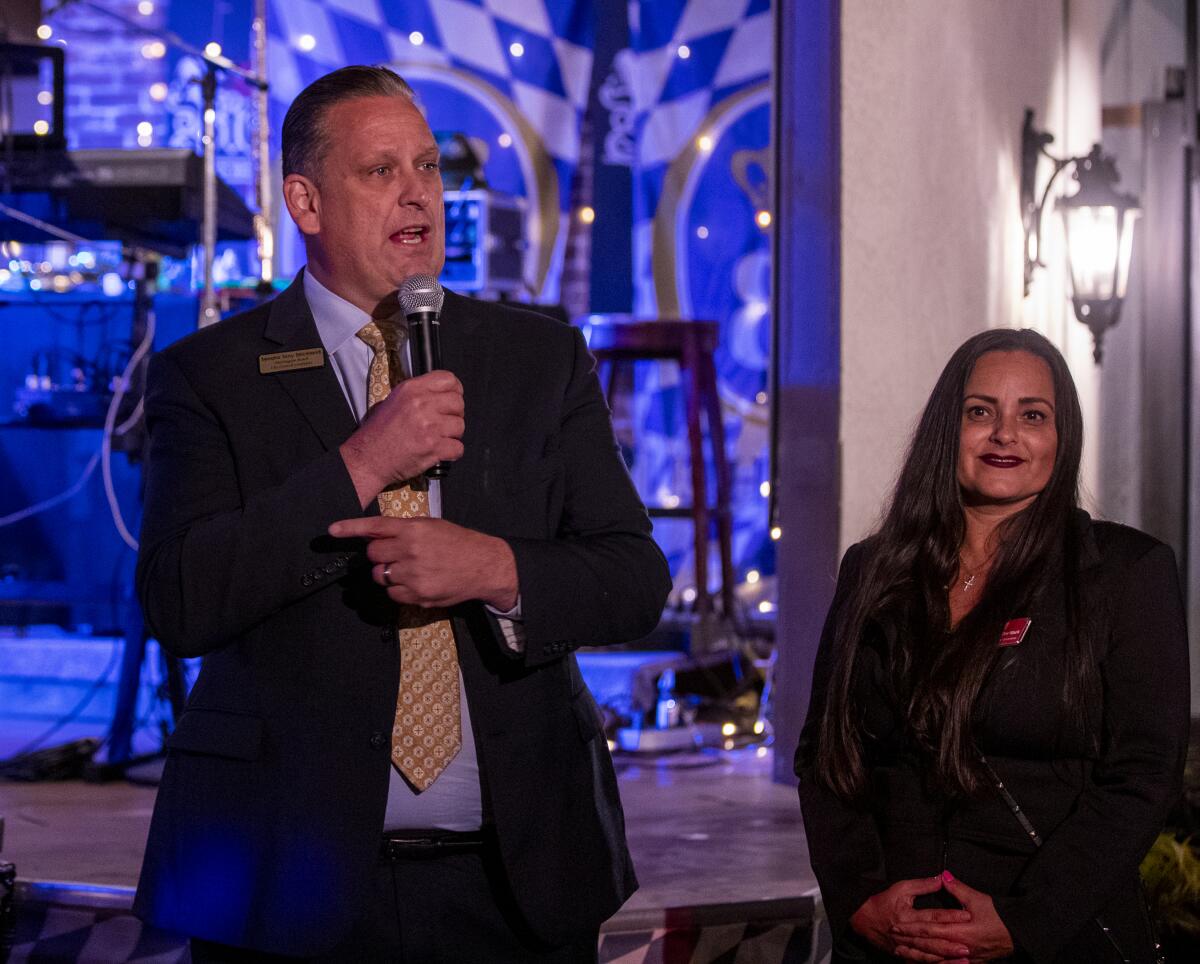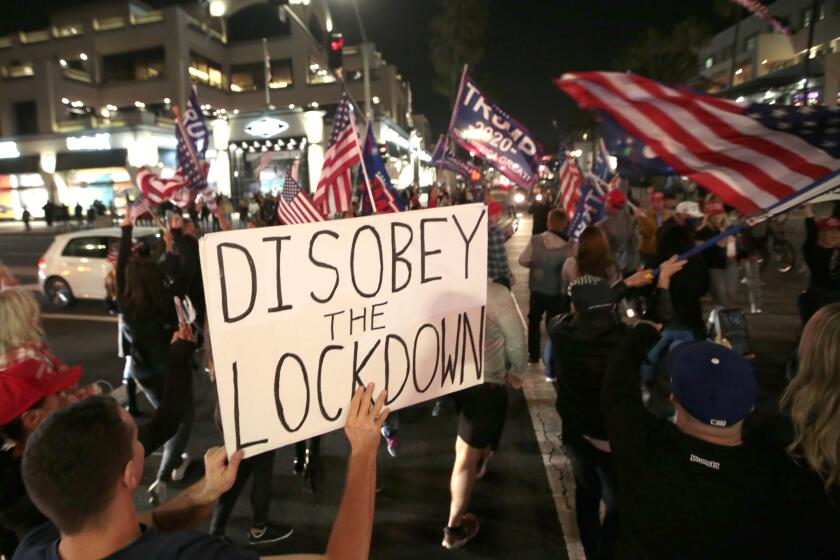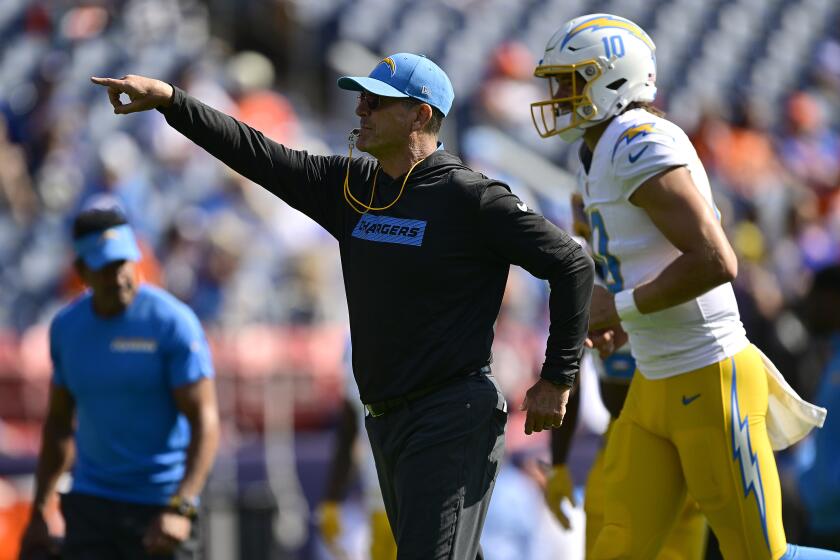Column: Scapegoating a kumbaya interfaith group? Stay classy, Huntington Beach

Bagels and danishes sat largely untouched at the monthly meeting of the Greater Huntington Beach Interfaith Council, which aims to bring peace, love and understanding to a city perpetually in need of each.
About 20 members gathered at tables or Zoomed in last Tuesday, focused intently on the latest intolerant troublemakers to plague Surf City.
Them?
A week earlier, the City Council had decided to reevaluate the invocations offered before every meeting.
For at least 17 years, a handshake agreement has left the task to the Interfaith Council. The only guidelines: No proselytizing, no politics and keep to under a minute.
The resolution passed by the City Council claimed that the interfaith group had turned invocations into “political soapboxing opportunities.”
Republican Mayor Tony Strickland — a former assemblymember and state senator who co-authored the resolution with fellow Republican Gracey Van Der Mark — said he had received “hundreds” of complaints about the matter.
“It has been a problem, and it’s a problem that needs to be fixed,” he said at the council meeting.
Van Der Mark, part of a new conservative council majority, proposed that the city create a list of “certified” religious leaders to handle the invocations. Strickland said this would ensure that no one from a “hate group” could ever participate.
Huntington Beach has always been conservative, but the governor, masks rules and a new coronavirus curfew have fueled all-out rage.
Members of the Interfaith Council learned of the proposal only after someone from the city manager’s office called to let them know.
On Tuesday, their meeting began with — what else? — an invocation.
Elaine Keeley read “First they came ...” — the iconic poem by a German Lutheran pastor who bemoaned his own silence as the Nazis came for socialists, trade unionists, Jews and then him.
Keely’s father, former Huntington Beach Mayor Ralph Bauer, helped to found the Interfaith Council in 1996.
“I think this is what he would’ve wanted to read today,” she said.
President Maneck Bhujwala told his colleagues that he had reviewed a year’s worth of their invocations and found nothing remotely objectionable.
“We’ve done a very good job,” asserted the volunteer Zoroastrian priest.
Rabbi Stephen Einstein, a past president and co-founder of the Interfaith Council, saw Strickland’s move as part of an “agenda that is very much at odds with the warm and welcome attitude we have.”
That drew a rebuke by Dave Garofalo, a former Huntington Beach mayor banned from running for office after pleading guilty in 2002 to a felony and 15 misdemeanors for violating conflict-of-interest laws.
“We have contributed to this,” Garofalo said, criticizing what he described as Einstein’s history of “not just passive but aggressive comments” toward council members in past meetings.
The rabbi countered that he had never let his political opinions slip into his invocations. Garofalo continued to insist that the Interfaith Council had “politicized” what should remain apolitical.
“What happened, happened,” Bhujwala said politely but firmly. “We will move forward. This just reminds us of the importance of our mission. We shouldn’t take it personal.”
After the meeting, members still wanted to know which one of them had said the things that Strickland claimed they did.
“I wanted specifics instead of ‘hundreds of complaints,’ ” Bhujwala said. “I want to know what was it, so we ourselves can talk to that person. Right now, we don’t even have the specifics.”
“I have not seen a pattern of the things that have been alleged,” said Don Garrick, who sits on the board of the Orange County Interfaith Council. “If it’s just one incident, is that really fair? You make laws based on a general thing, not a one-time thing.”
I told Garrick that I had reviewed every invocation since the beginning of 2022 — a parade of Catholic deacons, Episcopalian priests, rabbis, evangelical Christians, an imam, a Methodist and others. Only two bordered on the controversial.
One woman mentioned Jesus’ promise to separate the sheep from the goats on the Last Judgment.
The other invocation was delivered by Einstein on Dec. 6, when Strickland, Van Der Mark and two other Republicans were sworn in.
The rabbi decried the “deterioration of kindness and decency, both locally and nationally” and mentioned religious groups that had faced hate crimes in Orange County that year.
“Christians!” some in the crowd angrily yelled, drawing a puzzled look from Einstein.
The rest of the invocations, I told Garrick, were well-meaning pablum.
“Hey!” joked past Interfaith Council President Charlie Neiderman. “I put a lot of deliberation into mine!”
“The city can never tell us how to pray,” said Vice President Jynene Johnson.
She’s right that Huntington Beach legally can’t do that — but the city can choose who prays before meetings. A 2014 Supreme Court ruling allowed governing bodies to pick who does invocations, provided it’s not just one faith’s viewpoint all the time.
The Supreme Court’s decision Monday to allow Christian prayers at city council and other public meetings divided justices not only ideologically, but along religious lines as well.
Erwin Chemerinsky, dean of UC Berkeley School of Law and a constitutional law scholar, said Huntington Beach “can certainly take [invocation duties] away, and they can give it to someone else. That doesn’t violate the 1st Amendment. But if they only had it from one faith or one political ideology, that would be unconstitutional.”
Until recently, Huntington Beach had been slowly turning from Orange County’s too-tanned crucible of conservative kookiness into something more … normal?
The council — including MMA legend and arch-pandejo Tito Ortiz — voted in 2021 to allow the Pride flag to fly in front of City Hall. That same year, Rhonda Bolton became the city’s first Black council member, as the council turned — gasp! — majority liberal.
That was then. After Einstein’s invocation, the new conservative majority voted to appoint Strickland mayor over Democratic Councilmember Dan Kalmick.
They also invited Calvary Chapel of the Harbour pastor Joe Pedick — who addressed an H.B. Stop the Steal rally in late 2020 — to give a second invocation. In his four-minute spiel, Pedick looked at the council members and said, “Lord, we know that each one up here, they’re under attack.”
Soon after, the council majority banned the Pride flag and other non-governmental banners from flying on city property. They also vowed to rumble with Gov. Gavin Newsom yet again over what they said was a conspiracy to urbanize Surf City.
But scapegoating a kumbaya interfaith group? Stay classy, Huntington Beach!

“We have very important matters to manage in the city, and I don’t know why they [the council majority] focus on it,” said Democratic Councilmember Natalie Moser, who attended the Interfaith Council gathering and had a tense exchange with Strickland about the invocations at the Feb. 21 council meeting. “All it does is that it makes us look like a city that’s exclusionary and bigoted — and this is an ongoing thing.”
Strickland admitted that Huntington Beach has “bigger issues to fry.”
The invocations became a priority because “this is just something that came to me from the community,” he said. He described Einstein’s Dec. 6 comments as a “very, very political invocation that I had never seen before.”
When I asked for more examples, the mayor replied, “It’s hard to describe, but just look and hear them. You’ll see they have a political nature.”
When I told them I had reviewed a year’s worth and found only two nebulously problematic ones — one of which quoted Christ — Strickland paused, then said, “Everyone can look at different things and come with a different perspective.”
He also didn’t find it appropriate that Einstein has been “very open in attacking” Van Der Mark — Huntington Beach’s first Latina council member.
In 2018, Einstein and others had demanded that Van Der Mark resign from Huntington Beach school district and City Council commissions for creating a YouTube playlist titled “Holocaust Hoax?” that featured antisemitic videos. She left a comment on another video about an anti-racism workshop in Santa Monica, saying that “colored people were there doing what the elderly Jewish people instructed them to do.” (Van Der Mark said then that her words were taken out of context, that the playlist was for “research purposes,” and that she wasn’t antisemitic.)
When I pointed out that Einstein had criticized Van Der Mark during public comments and not during invocations, Strickland said, “That’s true, but again, this is an issue.”
The mayor said he would meet with Bhujwala soon. “Maybe we just have a heart-to-heart and say, ‘Try to be a bit more careful and really make it apolitical.’”
In an interview before the Interfaith Council meeting, Bhujwala told me, “I feel that if the city takes over [invocations], then it will be a lot of extra work for them to manage this kind of diversity and continue the peace we have helped in the city.”
He then chuckled.
“If they think they can do a better job, good luck to them.”
Arellano is a columnist for the Los Angeles Times.
All the latest on Orange County from Orange County.
Get our free TimesOC newsletter.
You may occasionally receive promotional content from the Daily Pilot.





